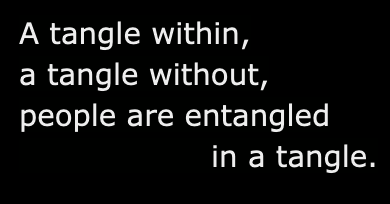Opinions, Assumptions, and Beliefs
All of them tangle you up
The bahiya sutta is a direct pointer to enlightenment: in the heard only the heard, in the seen only the seen, the cognized only the cognized. The problems emerge when the cognized proliferates. Worlds are brought forth. Pasts and futures are constructed. This world of shadows is acted on and reacted to. All of this blinds and binds. Some of these patterns of proliferation have textures that are recognizable with practice. For example, opinions.
Part I: Opinions
Opinions tend to be easy to identify. They often feel hard and angular to me. They rile the system up. They often emerge along with pride, ego, self – opinions can act as accouterments of the self like petals on a flower, an overlay on reality that can create a subtle overemphasis on a perceived self. Opinions pull here, pull there, and the system is happy for the excitement. Until it gets exhausted with it. Then perhaps it is left with an unease, a subtle feeling that this isn’t quite right. There is suffering there, in the vein of one of the meanings of the Pali word for suffering, dukkha – a wheel off its axle, the discomfort inherent in life. Something is just off, again.
I remember there was a time when I didn’t have so many opinions. And then I remember a proliferation of opinions, along with a hardening self sense, somewhere around late adolescence. They were my opinions, concepts to identify with. I barely even remember what those opinions were about – probably around politics, the value of certain fields of study, what looks good, what doesn’t, who is better than others, how best to live. Some of these were transmitted from the people around me, some of them we formed in reaction to what the people around me thought. The opinions themselves don’t matter here, just that the tendency to form them accelerated at a certain point.
This is not to say that it’s bad to have opinions. But opinions lightly held are very different from those held with a vice grip. The more tightly they are held, the more they scrunch up and distort the fabric of observed reality, and that leads to pressure, unease, complexity and suffering.
(picture: an excerpt from the Jata Sutta: The Tangle)
Part II: Assumptions, and Part III: Beliefs coming soon.
Check out my book, The Jungle Cuts Through Itself: A Post-Awakening Journal.
Available on:
Kindle
or




As the saying goes, opinions are like assholes … everyone has one. 🙃
Opinions are most powerful when stated as facts, with little regard to who hears, cares, or argues. Age and experience solidifies this. Dropping "I think" is the key. It simply is.